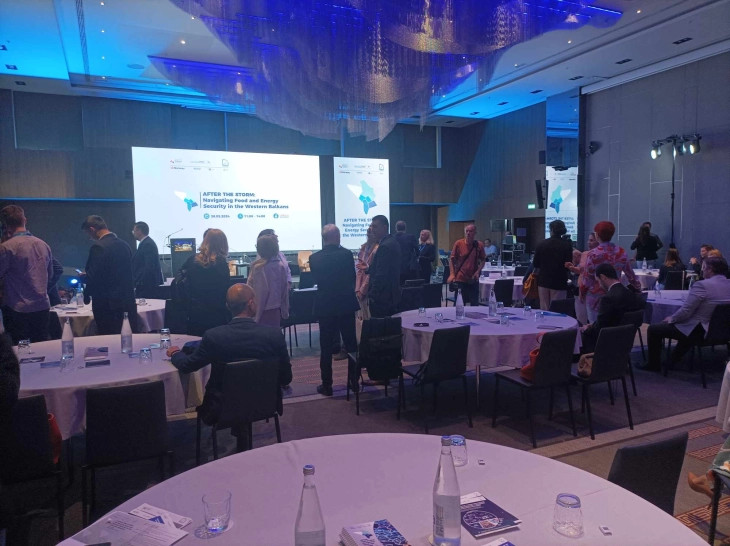Finance Think hosts economic forum on Western Balkans food and energy stability
- North Macedonia should focus on investments in the energy sector, speed up the replacement of coal with renewables, boost domestic production of electricity and food, and implement a serious redesign of state aid, especially in agriculture, concluded experts at an economic forum titled “After the Storm: Managing Food and Energy Stability in the Western Balkans” hosted by Finance Think on Thursday in Skopje.
- Post By Angel Dimoski
- 13:40, 30 May, 2024

Skopje, 30 May 2024 (MIA) - North Macedonia should focus on investments in the energy sector, speed up the replacement of coal with renewables, boost domestic production of electricity and food, and implement a serious redesign of state aid, especially in agriculture, concluded experts at an economic forum titled “After the Storm: Managing Food and Energy Stability in the Western Balkans” hosted by Finance Think on Thursday in Skopje.
These suggestions also generally refer to the other Western Balkan countries, which all implemented similar measures to tackle the energy crisis. Participants in the forum assessed that the measure showed results and there is greater price stability at the moment.
According to analyses, to produce a single unit of GDP, Western Balkan countries use three times as much energy as EU countries.

“The lessons that the Western Balkans, including Macedonia, learned are very similar to what Europe as a whole learned as well, which is that it is extremely important to in fact diversify your sources of energy, both in terms of what kind of energy sources you use and their geographic origin. An important lesson was that in this diversification, it is important to introduce more renewable sources of energy to replace the gas that was concentrated coming completely from one part of the world... In our region many concluded that it’s better to rely on our own coal, which is the main source of energy in our region, because it is stable, but they forgot to read the lesson that actually the huge costs that other countries had as well during the crisis came from the fact that our coal capacities are completely obsolete, and it will cost us more and more to try and preserve that and in fact we can replace our coal and much more easily fund this replacement with renewables... We have to be embarking and speeding up in replacing our obsolete, old, underfunded and, I have to say, mismanaged coal capacities with renewables,” Kori Udovički from the Center for Advanced Economic Studies (CEVES) said before the beginning of the Forum.
According to Finance Think’s executive director, Blagica Petreski, if the Western Balkan countries want to achieve greater self-sustainability and resilience in the future, they have to continue their reforms.
“The energy crisis seriously impacted the growth of food and energy prices. Apart from being dependent on the import of electricity and fossil fuels, inefficient consumption created an additional problem for the Western Balkan countries. They use 50 percent more electricity in order to produce an equivalent volume of gross domestic product as the EU countries,” Petreski said.

Petreski said the crisis had a significant impact on households.
“In Bosnia and Herzegovina the 17.4 percent growth in the price of electricity contributed to a 4 percent rise in poverty. Such situations have imposed the need of fiscal intervention. All Western Balkan countries introduced sets of measures to tackle the crisis. The assessment is that these measures are worth USD 3.5 billion. North Macedonia alone spent 3.2 percent of GDP on electricity subsidies in order to tackle the energy crisis. Investments in the energy sector and a serious redesign of state aid, especially in agriculture and where they are ineffective, are necessary,” Petreski said.
Photo/Video: MIA







